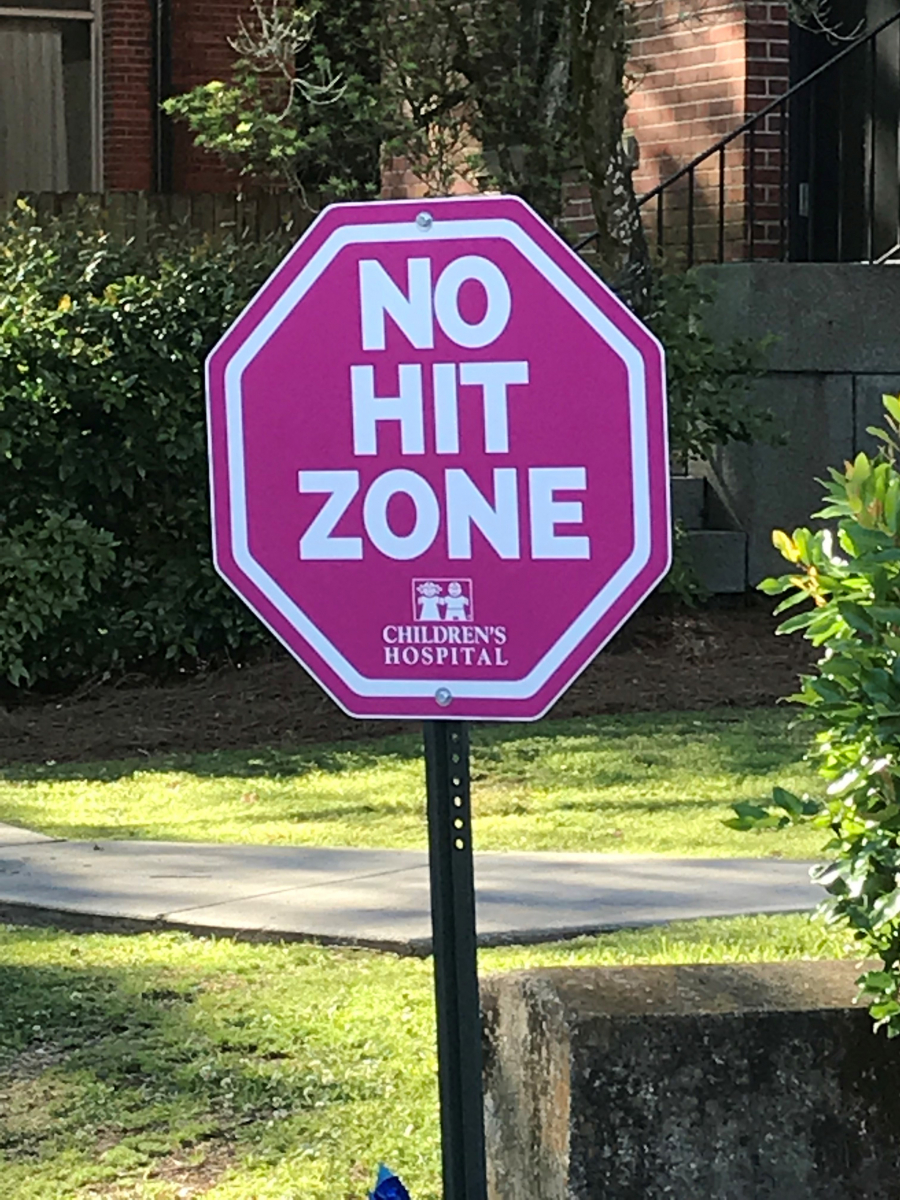 Hot pink stop signs emblazoned with the words “No Hit Zone” have been posted across Children’s Hospital’s main campus, Calhoun Street and State Street campuses, and outpatient clinics.
Hot pink stop signs emblazoned with the words “No Hit Zone” have been posted across Children’s Hospital’s main campus, Calhoun Street and State Street campuses, and outpatient clinics.
In posting the signs and sharing the message, Children’s Hospital’s Audrey Hepburn Children at Risk Evaluation (CARE) Center and the New Orleans Children’s Advocacy Center (NOCAC) are raising awareness about the most prevalent risk factor of child physical abuse – corporal punishment. The “No Hit Zone” signs illustrate the well-established harmful effects of corporal punishment and promote effective, painless parenting techniques.
“The launching of our 'No Hit Zones' is an important step in not only reducing violence exposure for all who visit Children's Hospital, but also creating a culture for the healthy development of children and families,” said John Nickens, IV, Children’s Hospital president and CEO.
The four basic tenets that are hallmarks of the “No Hit Zone” initiative are:
-No adult shall hit a child.
-No child shall hit an adult.
-No adult shall hit another adult.
-No child shall hit another child.
Children’s Hospital staff members are being trained to give parents resources for effective guidance and to explain the harms of physical discipline in a non-shaming or blaming fashion. The CARE Center is also providing opportunities for pediatricians, pediatric residents, and community members to practice communicating the negative effects of physical discipline.
“I am very pleased that Children's Hospital is the first hospital in Louisiana to adopt a ‘No Hit Zone,’” said Neha Mehta, MD, CARE Center medical director. “As a child abuse pediatrician with over 15 years of experience, I have seen firsthand the injuries to children who have been hit by their parents. I have been astonished by how many children I see with bruises and scars to their bodies from being ‘spanked’ by their parents and the number of children I see who didn't tell parents about sexual abuse because they feared being ‘whipped.’”
According to the CARE Center, across the nation, corporal punishment has become a social norm in disciplining children. It is also identified as the most prevalent risk factor for child abuse in America. In the south, where the incidence of spanking is above the national average, the number of children who are victims of physical force is even higher. Physical punishment hurts kids from all races and ethnicities. Fifty years of research demonstrating the adverse effects of corporal punishment led the CDC in 2016 to alter its definition of physical abuse. The amended definition describes physical abuse as “the use of physical force, such as hitting, shaking, burning, or other shows of force against a child,” removing the phrase “that resulted in injury” from its former explanation. Physical force leads to increased aggressive and risky behaviors in children, damage to brain development, and a lifelong impact on mental health. Corporal punishment has been shown to increase, rather than deter, undesired behaviors.
Originating at Rainbow Babies and Children’s Hospital in Cleveland, Ohio, in 2005, “No Hit Zones” have been successfully duplicated by numerous pediatric and adult hospitals and communities across the country. Posting “No Hit Zone” signage and training staff have been effective steps taken to create safe and caring environments for children, families, and staff. Because key informants—trusted pediatric providers—deliver this scientific, research-based message, parents are more likely to listen.
“Parents need to understand that hitting children is not only harmful, but also non-effective,” said Ellie Wetsman, CARE Center child abuse pediatrician. “I am delighted to see Children's Hospital take leadership to reduce violence experienced by children.” Throughout Children’s Hospital and its clinics across the state, “No Hit Zone” signs will be posted illustrating the well-established harmful effects of corporal punishment and promoting effective painless parenting techniques.
If a program, institution, school, or other locations wish to become a “No Hit Zone,” contact Stacie.Leblanc@lcmchealth.org.
